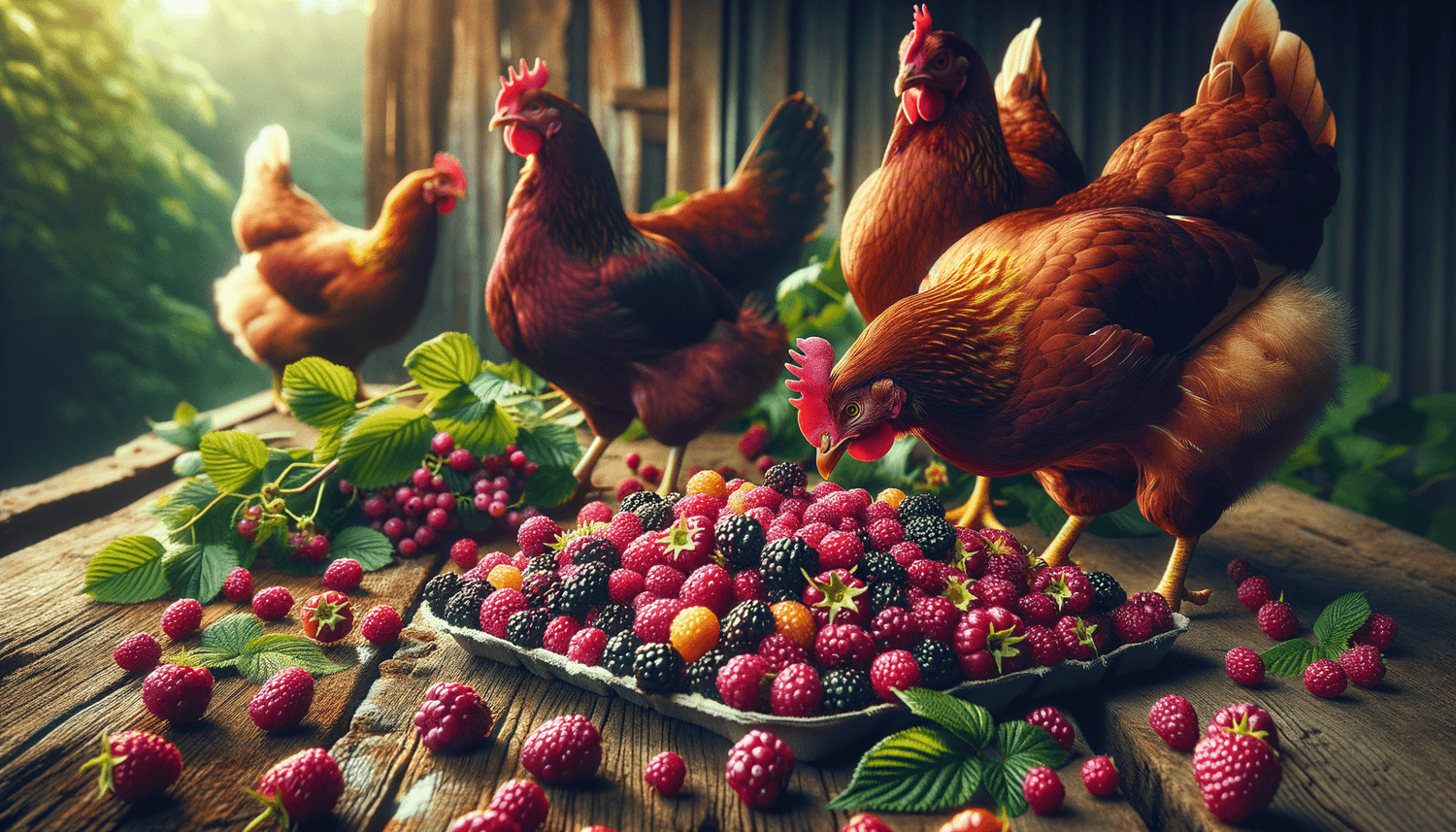Well, cluck my feathers! We’re here to discuss an intriguing and juicy topic that’ll have all our feathered friends a-clucking with excitement: Can chickens eat boysenberries? In this delightful blog post, we’ll be pecking our way through the scrumptious possibilities of backyard birds feasting on these delectable berries. We’ll cover everything from the ins and outs of a well-rounded chicken diet, to the nutritional benefits and potential risks, and finally, we’ll tackle the preparations required for a berry-licious treat you can confidently serve to your plucky companions. So buckle up, hold on to your eggs, and let’s dive into the world of boysenberries and backyard chickens!
Can chickens eat boysenberries?
Yes, chickens can certainly eat boysenberries, and it is safe for them to do so! Boysenberries are a nutritious and delicious treat that provides them with essential vitamins and antioxidants. Just remember to keep the boysenberries in moderation, as too much of a good thing can upset their balanced diet.
A balanced diet for happy hens
Just like us humans, our feathered friends require a balanced diet to stay healthy and productive. A chicken’s diet should primarily consist of high-quality chicken feed, which provides them with the essential nutrients, vitamins, and minerals they need for optimal growth, laying, and overall health. This chicken feed should make up around 80-90% of their diet, ensuring they get a proper nutritional foundation.
The remaining 10-20% of a chicken’s diet can be comprised of treats, such as fruits and vegetables. These treats are not only for enjoyment but also provide additional nutrients and variety to their daily menu. Boysenberries can be a delightful treat that they’ll love to gobble up. It’s important to remember that treats, like fruits and veggies, should be given in moderation to avoid disrupting their balanced diet or causing potential health issues. So go ahead and indulge your clucking companions with some tasty treats, just be sure to keep them as occasional additions to their chicken feed.
Nutritional value of boysenberries for chickens.
Feeding boysenberries to chickens offers some noteworthy nutritional benefits for our feathered backyard friends. Boysenberries are a rich source of vitamins, minerals, and antioxidants that contribute to the overall health of the chickens. One of these vitamins is vitamin C, which is essential in boosting the immune system and helping the birds cope with stress. Birds can also benefit from the vitamin K found in boysenberries, which aids in blood clotting and bone health.
Besides these vitamins, boysenberries provide essential minerals such as calcium, magnesium, and potassium. Calcium is vital in laying hens for the production of strong eggshells, while magnesium and potassium contribute to the overall well-being by regulating bodily functions, maintaining nerve function, and promoting bone health. Furthermore, boysenberries are a great source of hydration, as they have high water content, which is especially beneficial during hot summer days when chickens need extra water to stay cool and hydrated.
The antioxidants present in boysenberries, including anthocyanins and flavonoids, help in preventing cellular damage in chickens by neutralizing free radicals. These antioxidants also contribute to improved cardiovascular health, which is crucial for maintaining a chicken’s overall vitality. While the dietary fiber found in boysenberries is also beneficial for digestion, chickens should be given these berries in moderation, as they may consume too much in a short period, causing gastrointestinal issues.
Nutrition table of boysenberries for chickens.
| Information | Description |
|---|---|
| Nutritional Value | Rich in vitamins (C, K), minerals (calcium, magnesium, potassium), antioxidants, and dietary fiber. |
| Suggested Serving Size | Small handful per chicken (remember, treats should make up only 10-20% of their diet). |
| Safe Feeding Practices | Feed in moderation, avoid overfeeding to prevent gastrointestinal issues. |
| Preparation | Wash the boysenberries thoroughly and serve them fresh or frozen. |
| Potential Risks | None when fed in moderation, but overconsumption can cause gastrointestinal problems. |
| Hydration | Boysenberries have high water content, beneficial during hot weather for added hydration. |
| Digestion | Dietary fiber in boysenberries is good for digestion but feed in moderation to prevent issues. |
| Seasonal Availability | Fresh boysenberries are available in summer, but can be frozen for year-round feeding. |
| Other Benefits | Boosts immune system, improves cardiovascular health, aids nerve function, and bone health. |
Preparing boysenberries for chickens
When preparing boysenberries for your chickens, make sure to wash them thoroughly to remove dirt, pesticides, or other contaminants. Fresh boysenberries are excellent, but you can also freeze them and serve them as a cool treat during hot days. Frozen boysenberries are equally nutritious and offer an added bonus of lasting longer than fresh berries, so you can provide them to your chickens throughout the year.
Introducing boysenberries to your flock
When introducing boysenberries or any new food to your chicken flock, it’s essential to start with a small serving and observe if the birds show any adverse reactions. Chickens have individual tastes and preferences, and not all birds may be fond of a particular treat. Give your chickens time to adjust to the new treat and always be mindful of the suggested serving size.
Other berry options for your chickens
If your backyard flock enjoys snacking on boysenberries, you might want to provide them with more berry options, such as strawberries, blueberries, raspberries, and blackberries. These berries also contain similar nutrients and offer a delicious treat for your chickens. However, keep in mind the concept of moderation and remember that treats should only make up 10-20% of your chickens’ diet. The majority must always consist of high-quality chicken feed to ensure balanced and healthy nutrition.
Happy berry snacking for your feathered friends!

















